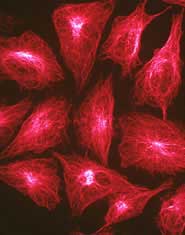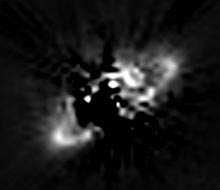The first clinical trial in Europe of a revolutionary approach to diagnosing breast cancer has just got under way at one of the UK’s leading breast cancer centres.
The research involves a minute endoscope, no thicker than a few strands of human hair, which can pass through the nipple and search for the earliest signs of cancer within the breast.
Consultant breast surgeon, Dr Nicolas Beechey-Newman from Guy’s Hospital in London, told a news briefing at the 3rd European Breast Cancer Confe
New algorithm exploits community structure of the web.
The web has spontaneously organized itself into communities. A new search algorithm that pinpoints these could help surfers find what they want and avoid offensive content.
Page builders can link anywhere. But they don’t, Gary Flake, of the NEC Research Institute in Princeton, and his colleagues have found. Instead, pages congregate into social groups that focus most of their attention on each other.
Web dir

Glowing nanobots map microscopic surfaces.
Unleashing hordes of molecular robots to explore a surface’s terrain can produce maps of microscopic structures and devices with higher resolutions than those produced by conventional microscopes, new research shows.
Each robot has a ’light’ attached to it, allowing its random movements to be tracked around obstacles, through cracks or under overhangs. Adding the paths of hundreds of wandering nanobots together builds up a map of th

Markus Landgraf of the European Space Agency and colleagues (*) have found the first direct evidence that a bright disc of dust surrounds our Solar System, starting beyond the orbit of Saturn.
Remarkably, their discovery gives astronomers a way to determine which other stars in the Galaxy are most likely to harbour planets and allows mission planners to draw up a ’short-list’ of stars to be observed by ESA’s future planet-search missions, Eddington and Darwin.
The discovery of th
Nearly fifty years ago, researchers discovered that when cells in laboratory cultures are infected by a virus, they secrete a substance that protects other cells from infection. In 1957 Alick Issaks and Jean-Jacques Lindenmann traced this effect to a protein called interferon, a molecule now known to play a key role in the immune system. Human and animal cells produce it in a rapid “first wave” response to infections. Since its discovery, scientists have sought to use this natural substance to cure a
In the powerful, fast-fading realm of gamma-ray bursts, scientists say they have detected for the first time a lingering afterglow of the shortest types of bursts, which themselves disappear within a second.
This afterglow, radiating in X rays, may provide crucial insight into what triggers the mysterious bursts, the most energetic explosions in the Universe, second only to the big bang in total power. Previously, scientists had only detected the afterglow of longer bursts, which can last fr